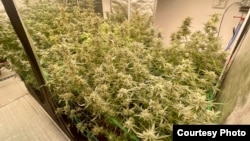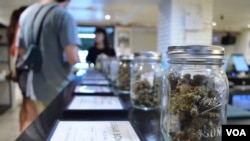In the days leading up to Thailand’s much-hyped legalization of cannabis on June 9, Health Minister Anutin Charnvirakul was still preaching the profit power of an herb that would soon be “like gold” for the country.
Last month was the culmination of a years-long campaign to turn the potent plant into Thailand’s next big cash crop and pave a new path out of poverty for struggling farmers.
From his political base in the country’s rural northeast, Anutin made that campaign the crux of his Bhumjaithai party’s run in the 2019 elections and parlayed a strong finish at the polls into his post as minister of health.
Recent opinion polls suggest the policy remains popular. But some still believe the minister’s bold predictions are less prophecy than bluster and that small farmers may end up reaping few of the rewards.
Unphased by the critics, Anutin doubled down on his predictions for cannabis at a panel discussion on the plant’s legalization in Bangkok, the capital, last week, projecting a $3 billion industry by 2027.
“Beneficiaries from this policy are among the people of every classification, from farmers to industrialists, from workers to entrepreneurs,” he said.
Cannabis, he promised, would help transform Thailand into “the wellness and medical hub of Asia and beyond.”
Profit potential
At JSP Pharmaceuticals Manufacturing, chief executive Sittichai Daengprasert said revenues could double by next year thanks to the government’s move to strike cannabis from the country’s narcotics list. His company harvests the plant for its valuable extracts, selling them on to local hospitals and adding them to its own line of products, from traditional medicines to health supplements and cosmetics.
Legalizing cannabis, Sittichai told VOA, gives local doctors and pharmacists more options to develop new medications and treatments, which will in turn spur demand for the plant from farmers, giving it plenty of cash crop potential.
“I agree, really, really agree,” he said. “Growing rice, growing sugarcane, growing tapioca, it’s no profit, but ... growing hemp and cannabis is really good for our government income and really good for the Thai people.”
He sees promise, too, for Thailand’s medical tourism sector, another prong of the government’s plans for cannabis.
Than Global Travel has been running medical cannabis tours across Thailand for the past two years. Its “patients” can stroll through fields of the pungent plant, dine on pot-laced meals and consult with specialist doctors ready to prescribe just the right course of herbal remedies.
Owner Kattikamas Thanyajaroen says business is booming. She’s exploring new markets, including India, where there is already a waiting list for her latest tour package.
Most customers ask if they can smoke the pot, too. With a comprehensive Cannabis and Hemp Bill meant to clarify the new dos and don'ts for the plant still moving through parliament, she has been telling them no — for now. For cannabis to truly give the country’s tourism sector a boost, she said the government should set aside areas where people can smoke openly in peace, starting with a few of the country’s travel hotspots like Phuket.
“For tourism, of course it’s good for [the] economy if you can do that, but it should be like [a] sandbox zone or separate zone ... for tourists,” she said.
Pock Petthong, who grows a few hundred pot plants out of his home in southern Thailand’s Prachuap Khiri Khan province, has been quietly stoking the tourist scene on Phuket and elsewhere for years through contacts at local bars and clubs. Now that it’s legal, he has been getting more calls for seeds, seedlings and buds than he can handle.
“I have 500 messages that I haven’t read,” he said.
Palm and rubber tree farmers around him are thinking of jumping into the market, too, he added, excited by talk of prices for a single kilogram of marijuana topping what some of them earn in a year.
“It will help Thailand’s business in every way if local people can get access to growing it or [get] involved in any of it without losing their leg or arm,” said Pock, and so long as “there is no backstabbing.”
That is just what some are worried about.
Risky business
Chokwan Chopaka, a longtime advocate for legalizing cannabis who runs her own dispensary in Bangkok, says the costs that small and medium enterprises, or SMEs, would have to face to start up and sell what they grow under current and proposed rules are more than many can afford. She said fees would include about $1,390 for a commercial grower’s license, $1,390 for a farm audit, and another $1,390 for anyone who wants to move into extracts.
“They always say that it will deliver people out of poverty; I don’t see this,” she said. “Thailand is built with SMEs and filled with small businesses, so if the bill goes through, I think we’re kind of screwed.”
She and others are proposing lower fees and other steps to help SMEs. They have an ally in Taopiphop Limjittrakorn, a lawmaker for the opposition Move Forward party involved in fine tuning the legislation.
More than the fees, though, Taopiphop said he worries about the many regulatory hoops small farmers will have to jump through as dictated by committees of unelected bureaucrats. He said there’s a common perception, which he shares, that these committees have already given politically connected businesses a head start in the cannabis market while tying up most everyone else in thickets of red tape. Taopiphop said he would rather give more power over setting the coming rules to elected officials directly accountable to voters.
Viroj Na Ranong, who heads the Thailand Development Research Institute’s health economics and agriculture team, has his doubts about the government’s forecasts for the cannabis industry, too.
He said the domestic market is too small to make cannabis a true cash crop, and that exports would be hampered by inadequate quality controls and the many countries that still treat the plant as an illegal drug. A few big, well-connected farm operators will manage to cash in, he said, but may have already driven market prices too low for most small farmers to start now and make a windfall. Promises that the plant can drive an exodus out of poverty, Viroj added, may have more to do with winning votes than sober analysis.
“It can be very lucrative for a big firm and a big plantation, but for general small farmers, I don’t think they will make a lot of money,” he said. “The market has not been well established and ... they will not be able to make substantial production, at least for now.”







